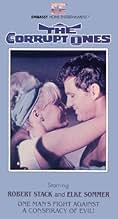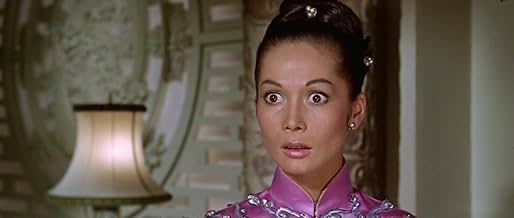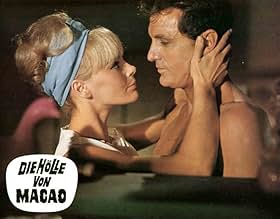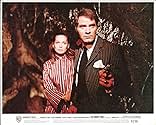Spy accidentally gets an ancient treasure. Several corrupt groups try to steal it from him.Spy accidentally gets an ancient treasure. Several corrupt groups try to steal it from him.Spy accidentally gets an ancient treasure. Several corrupt groups try to steal it from him.
Hans Heyde
- Hugo
- (as Dean Heyde)
Ah Yue Lou
- Chow
- (as Ah-Yue Lou)
Rosemarie Stack
- Bar Patron
- (as Rosemary Bowe)
Heidy Bohlen
- Jasmine
- (uncredited)
Maria Minh
- Choo Minh
- (uncredited)
Featured reviews
I knew this title from many years ago but never bothered to watch it until now. After I watched it, I realized that the Italians had made many "similar" movies a couple of years earlier. Just to name a few: HONG KONG, HOT HARBOUR, BLACK PANTHER OF RATANA, MYSTERY OF THE RED JUNGLE, SECRET OF THE CHINESE CARNATION, MISSION TO HELL...etc. All with similar plot twists and action but none of which had the elaborate budget that The Corrupt Ones had. But all were made a few years earlier. So why bother making The Corrupt ones in 1967 when so many similar stories already existed? I guess some producer had money to burn. The Corrupt Ones is still worth watching, but do check out the other titles. Larry Anderson.
"The Corrupt Ones" is a Cold War-era adventure story about a chase for the Peking Medallion, which is the key to an ancient Chinese treasure. The stars are Robert Stack and Elke Sommer, but, as is usual in this type of film, the villains, of whom Nancy Kwan is the chief, are more colorful. The film starts with a fight for the medallion on board a train, and the pace rarely lets up from there. It's a great time waster, if you've got the time to waste. Of course, this particular genre was done practically to death by the Indian Jones series, but, if you can get past the low budget, there's a lot to enjoy here, not the least of which is Dusty Springfield's singing of the title tune. It's one of those multi-country productions, and that makes for an appealing supporting cast, but someone ought to have been shot for dubbing Elke Sommer's beautiful voice in English. She sounds like a real simp. Citizens of Macao, by the way, must have been shocked by the tagline: "The Deadliest City in the World Is about to Get Deadlier!"
This movie begins with a fight between a man named "Danny Mancini" (Maurizio Arena) and an unknown assailant on a train in China near the border of Macao. As it so happens Danny kills the man and in the process retrieves a precious medallion. While on his way back to Macao he encounters another man by the name of "Cliff Wilder" (Robert Stack) who is trying to escape Chinese border guards for attempting to obtain unauthorized photographs for a magazine. Since they are both headed in the same direction Danny offers to help Cliff escape by giving him a ride in his boat. However, once they get to Macao Danny notices that he is being followed and asks Cliff to hold onto the medallion for a little while. Not long afterward, a pretty blonde is discovered by Cliff in his room looking for something. When confronted by Cliff she reveals that her name is "Lily Mancini" (Elke Sommer) and that she is the wife of Danny and that he told her to come by and pick up the package that he gave to him. When he refuses to give it to her she pulls a gun on him. Fortunately, Danny is quicker than she is and manages to grab the gun from her before she can fire it. Although he allows her to leave his hotel room their paths will soon cross again-along with several other characters who also want the medallion. Now rather than reveal any more and risk spoiling it for those who haven't seen it I will just say that this movie had some good things going for it. Filmed in 1967--in the exotic location of Macao--it had some good actors like Robert Stack, Nancy Kwan (as "Tina") and the aforementioned Elke Sommer. Along with that it had enough intrigue and action to keep me interested as well. It even had Dusty Springfield singing the opening title track. Yet, in spite of it all, the plot was a bit unrealistic and the film suffers as a result. But, like I said earlier, it was still somewhat entertaining and I have rated it accordingly. Slightly above average.
This movie doesn't start out too promisingly, with a claustrophobic, ho-hum fight between two guys in a boxcar (oh boy, a fight in a boxcar!). Then, during the credits, a shot of the passing train actually includes a moment where the camera wobbles quite badly. "Oh God," I thought, "what kind of low-budget boredom am I in for?" As it turns out, the movie gathers itself like a train gathering speed, becoming more splashy, ridiculous, and rollicking as it goes along. And it is perhaps not too low-budget, either--it may not be Bond, but the sets are suitably exotic and eye-catching, with a rich, velvety decadence permeating the proceedings. Robert Stack is amusingly noxious as a freelance photographer who tries to kiss every woman who is trying to steal from him or kill him. Within seconds of meeting her. In fact, if you're a woman, he's probably trying to kiss you. That would include Elke Sommer, of course, but even more notable is Nancy Kwan, who steals the movie along with her bad guy enemy/ cohort Christian Marquand (he's the plantation owner in Apocalypse Now Redux). The plot is ridiculous, the finer points are ridiculous, and the movie would not be half as entertaining were it not so. For a movie largely known for the title track, sung by Dusty Springfield, a lot more fun than I expected.
Nothing to add, really, to the earlier reviews except to clarify some things about the film. The location is never really stated explicitly in the film, except that it is somewhere on the border of 'Red China' where foreigners are safe. In 1967 that is either Hong Kong or Macau. Since there is legal gambling shown going on, it has to be notionally Macau. Except that I cannot detect a single scene shot in Macau. Many of the interiors look like they were done on a European sound stage as well.
All the street signs, for example, have Chinese and English text (= Hong Kong; in Macau it is Chinese and Portuguese.) There are identifiable shooting locations in Hong Kong. The opening train sequence is shot on the Kowloon-Canton Railway tracks somewhere in the vicinity of Taipo. There is a back-projected car ride down Nathan Road, Kowloon, and one can see the wall and gate of St. Andrew's Church for a second or two. Earlier, there's a car ride shot in Wanchai. There are several scenes shots in Aberdeen, and a little booth selling tickets for the "Ap Lei Chau Ferry" (this was before there was a bridge there.) Some of the waterfront/speedboat shots appear to have been done in Clear Water Bay or Sai Kung, probably because of the proximity of the Shaw Brothers Studio which might have offered some advice. Perhaps most amusing is the 'Temple of the Bells' under which the treasure is buried, which is actually the exterior of the Roman Catholic Diocesan Seminary at Wong Chuk Hang! For me it's actually these shots of a run-down but livable Hong Kong in the Vietnam War era that are most interesting, a document that preserves a lot of footage of a place that has now completely disappeared under 20 years of 'Red Chinese' rule.
All the street signs, for example, have Chinese and English text (= Hong Kong; in Macau it is Chinese and Portuguese.) There are identifiable shooting locations in Hong Kong. The opening train sequence is shot on the Kowloon-Canton Railway tracks somewhere in the vicinity of Taipo. There is a back-projected car ride down Nathan Road, Kowloon, and one can see the wall and gate of St. Andrew's Church for a second or two. Earlier, there's a car ride shot in Wanchai. There are several scenes shots in Aberdeen, and a little booth selling tickets for the "Ap Lei Chau Ferry" (this was before there was a bridge there.) Some of the waterfront/speedboat shots appear to have been done in Clear Water Bay or Sai Kung, probably because of the proximity of the Shaw Brothers Studio which might have offered some advice. Perhaps most amusing is the 'Temple of the Bells' under which the treasure is buried, which is actually the exterior of the Roman Catholic Diocesan Seminary at Wong Chuk Hang! For me it's actually these shots of a run-down but livable Hong Kong in the Vietnam War era that are most interesting, a document that preserves a lot of footage of a place that has now completely disappeared under 20 years of 'Red Chinese' rule.
Did you know
- TriviaHeidy Bohlen's debut.
- Quotes
Cliff Wilder: Thanks.
Danny: For what? It's my boat I was looking after, not you.
Cliff Wilder: That figures.
- ConnectionsReferenced in The Hotel New Hampshire (1984)
Details
- Release date
- Countries of origin
- Language
- Also known as
- The Peking Medallion
- Filming locations
- Production companies
- See more company credits at IMDbPro
- Runtime
- 1h 33m(93 min)
- Sound mix
- Aspect ratio
- 2.35 : 1
Contribute to this page
Suggest an edit or add missing content
































